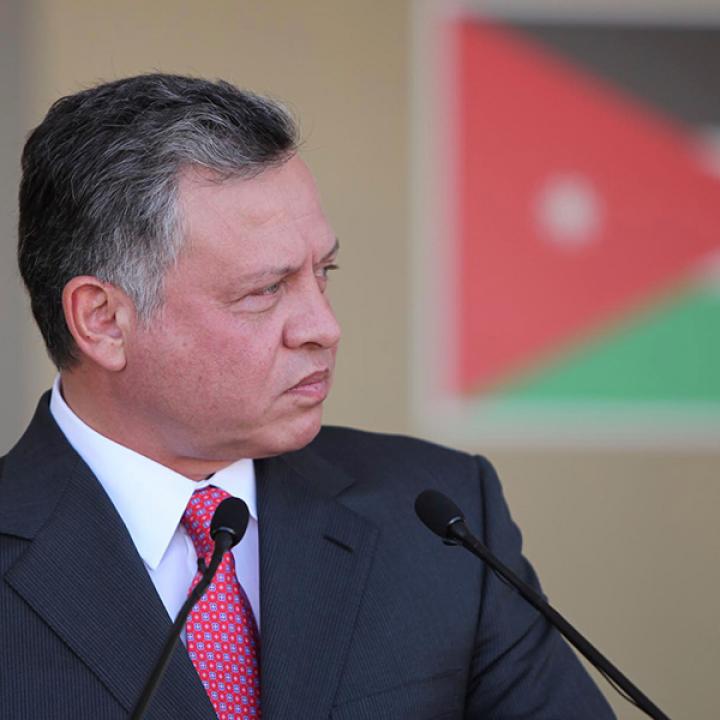
- Policy Analysis
- Policy Alert
Jordanians Protest Conviction of Sergeant Who Killed U.S. Troops

The latest demonstrations are unusual in that they highlight the divergence of the Western-oriented palace from much of the Jordanian people, who according to polling do not like the United States very much.
In Amman on July 17, a Jordanian military court convicted 1st Sgt. Maarek Abu Tayeh of the premeditated killing of three U.S. Green Berets last November at Prince Faisal Air Base in al-Jafr, in the kingdom's south. He was sentenced to life in prison with hard labor, with the possibility of release in twenty years for good behavior. Since the ruling, Abu Tayeh's tribe, the Howeitat, has been protesting and angrily denouncing the monarchy. Hosting 1.4 million Syrian refugees and already facing increased security challenges, the coincidence of these demonstrations with local unrest prompted by violence in Jerusalem comes at a difficult time for the kingdom.
The Howeitat tribe was an early and important supporter of Hashemite rule in the kingdom in the 1940s. But the large southern tribe has frequently proved an unruly ally of the palace. Episodic Howeitat demonstrations in its stronghold of Maan -- during which the tribe has at times feigned support for Saudi royals as an alternative to Hashemite reign -- have long been an irritant to Jordan's ruling family. Over the years, however, the palace has largely been able to mollify discontent in this economically disadvantaged area with patronage politics.
Following the military court ruling, the tribe's Facebook page -- which has 41,000 followers -- called for demonstrations in al-Jafr. Postings on the page on the day of the ruling disparaged the U.S. military presence in the kingdom and criticized the Jordanian military for "abandon[ing] [Abu Tayeh] instead of protecting him." The ruling, it continued, would "be the gate for the military to get rid of the burden of the son [King Abdullah II] who has pushed the boundaries way too much from the heritage of the country and the heritage of his father [King Hussein]."
The Facebook page banner now reads "Remember the bullets of Maarek Abu Tayeh; Forget the bullets of Awda Abu Tayeh," the tribal sheikh and leader of the Great Arab Revolt who allied with the Hashemites to expel the Ottoman Empire from what today is southern Jordan. Postings include videos of the tribesmen on camels carrying Saudi flags.
On July 18, the Howeitat protested by burning cars and tires in al-Jafr and along Highway 15, closing the road between Maan and Wadi Rum and prompting the U.S. embassy in Amman to issue a local travel advisory to American citizens in the kingdom. On the evening of July 18, unknown assailants opened fire at the air base. And early this morning, a convoy of Howeitat tribesmen attempted to travel from Maan to Amman to hold demonstrations at the U.S. embassy and Royal Court. Anticipating violence, the government reportedly closed roads to protestors, deployed additional security personnel, and set up a checkpoint to inspect vehicles entering the capital.
It is unclear how long the tribe will sustain the demonstrations, or whether the anger -- with the palace and the United States -- will extend beyond the Howeitat to other tribesmen in the kingdom. Members of other large tribes, such as the Bani Hassan, have expressed solidarity on Facebook. But virtual reality matters less than what occurs on the ground. Jordanian authorities have much experience containing and limiting demonstrations, and the Jordanian public, since 2011, has exhibited little appetite for risking instability by protesting.
Yet the closure of al-Haram al-Sharif/Temple Mount, following the shooting of two Israeli policemen by three Israeli Arabs on July 14, has generated additional demonstrations -- albeit composed largely of Jordanians of Palestinian as opposed to tribal origin. On July 16, hundreds of Jordanians marched in Amman, protesting the closure. And although entry to the al-Aqsa Mosque has resumed, newly installed Israeli metal detectors -- as well as incendiary statements from Jordanian speaker of parliament Atef Tarawneh -- will likely propel larger marches this coming Friday, July 21.
Compared to other Arab states, the kingdom has seen relatively few protests in recent years. What is unusual and important about the Abu Tayeh demonstrations is that they highlight the divergence of the Western-oriented palace from much of the Jordanian people, who according to polling don't like the United States very much. And ferment among the tribes -- which staff the Jordanian military and security apparatus -- is a much bigger concern than the by-now de rigueur anti-Israel marches. Ultimately, Jordan will likely overcome this particular crisis, and the population will revert to more traditional and mundane worries such as those centering on the abysmal economy and endemic unemployment. For the time being, though, these protests can be added to the substantial and growing list of challenges faced by the kingdom.
David Schenker is the Aufzien Fellow and director of the Program on Arab Politics at The Washington Institute.

